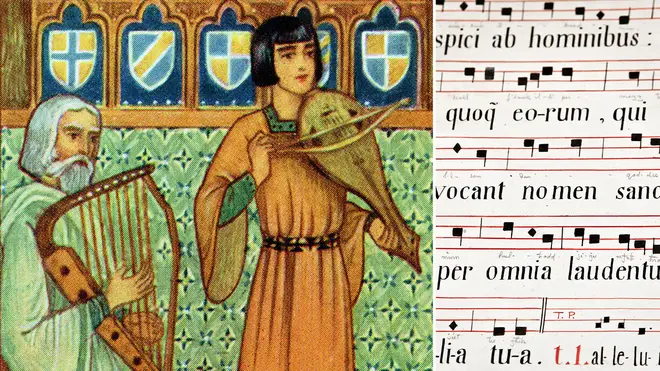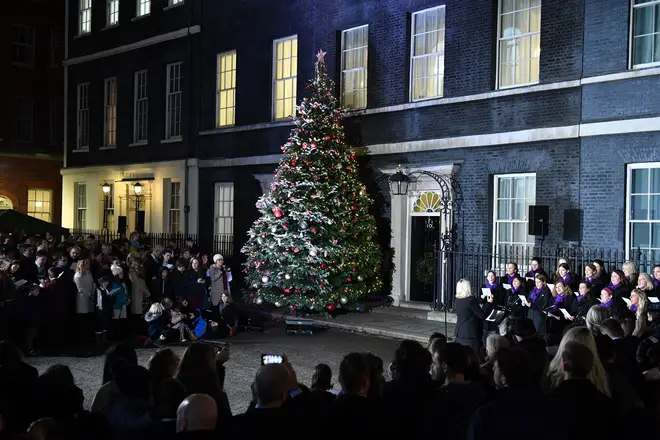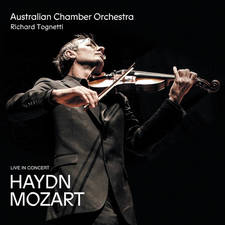The surprising origins of Christmas carols: explained
23 December 2021, 11:59

If we take the dictionary definition, Christmas carols are “traditional songs that are sung just before Christmas that celebrate the birth of Jesus Christ”. But look deeper, and you’ll find a long and fascinating history...
In 1928, the Choir of King’s College, Cambridge’s Christmas Eve carol service was broadcast over the public airwaves for the very first time.
The same year saw The Oxford Book of Carols – edited by Percy Dearmer, Ralph Vaughan Williams, and Martin Shaw –published, aiding the wide enjoyment of festive hymns throughout the population.
But what are the origins of the Christmas carol? What actually is it to “sound Christmassy”? And why don’t we just sing Christmas carols all year round?
It’s not as obvious as you might think, so do indulge our festive feelings, and join us on a journey through the history of the Christmas carol…
Read more: The 20 best pieces of classical Christmas music

Once in Royal David's City – Chapel Choir of the Royal Hospital
What was the first Christmas carol?
It’s generally accepted that one of the first Christmas carols ever to be recorded was the 129 AD ‘Angels Hymn’, according to The New Daily. Around this time, Christianity-themed hymns started taking over the previous pagan songs celebrating Winter Solstice.
More and more slow, solemn hymns started to emerge in the fourth century, and by the 12th, songs referring to Nativity themes and creatures had emerged.
According to Oxford Dictionaries, one of the oldest printed carols is the ‘Boar’s Head Carol’, which dates from 1521. Apparently, it was traditionally heard annually at Queen’s College, Oxford as Christmas lunch was carried in.
‘Coventry Carol’ is a Medieval carol that endures in today’s Christmas programmes; and Renaissance composer, Victoria’s ‘O magnum mysterium’ remains popular.
Other traditional carols thought to be from the Middle Ages include ‘God Rest You Merry, Gentlemen’ and ‘While Shepherds Watched Their Flocks by Night’ – although the ‘God Rest Ye’ we know and love today is a Victorian setting (see below).
Read more: What are the lyrics to Coventry Carol, and what are they really about? >

King's College Cambridge 2010 #10 God Rest You Merry, Gentlemen
Carols and their words continued to be disseminated, even in the 16th century when Oliver Cromwell and the Puritans tried to ban the singing of carols.
Carols were being collected and printed widely by the 19th century. And in 1880, it’s believed the Christmas carol service was invented in Truro by an Edward White Benson, who later became the Archbishop of Canterbury.
Many of today’s most popular carols are dignified 19th-century offerings with tuneful melodies, rich harmonies and Christmassy sounds abundant.
‘Hark! The Herald’ – an 1840 tune from Mendelssohn. ‘Silent Night’? Composed in 1818 by Franz Xaver Gruber to lyrics by Joseph Mohr. ‘Good King Wenceslas’? – 1853 lyrics set to an older tune. The list goes on…
Read more: The real story behind ‘Silent Night’

When did people start ‘carolling’?
The notion of groups of carollers assembling in public spaces was a 19th-century one, according to Oxford. Called ‘waits’, these collections of singers used to gather to perform for passers-by, who traditionally thanked them with tasty offerings of drinks or mince pies.
It became known as wassailing and continues today, of course. Groups continue to sing – in squares or door-to-door – and it’s with unrestrained joy that we continue to sing carols in Christmas church services, in the chilly air or in restrained-yet-merry tones inside our houses as we put up the tree.

Ding! dong! merrily on high | Carols from King's 2018
What makes Christmas music so Christmassy?
There are several elements that go into something seeming to sound unquestionably Christmassy.
Stirring melodies are usually sprinkled with minor and diminished chords – think of the mix of major and minor melody lines in ‘God Rest Ye Merry Gentlemen’ – in popular Christmas carols and songs.
This all underpins lyrics that are nostalgic, and often as sombre as they are uplifting and inspiring. Centred around the miraculous story of Jesus’s birth, of course, the overall message of the Christmas carl is one of awe, humility, hope and abundant joy.
In more modern Christmas music, you can rely on a stick of ‘sleigh bells’ or similar to guarantee a Christmas auditory association.
Read more: What makes Christmas music so Christmassy?

O Holy Night – Choir of King's College Cambridge
Why aren’t Christmas carols sung all year round?
“Oh, well I wish it could be Christmas everyday, When the kids start singing and the band begins to play...” rock band Wizzard first sung in the 1970s.
Plenty of people do, and while we’re sure some sing Christmas carols all year round, it’s traditional to stick to singing carols in the lead-up to Christmas Day, if we’re to take Oxford’s definition of carols literally (see top of article).
The lead-up to Christmas is best seen as being from the start of Advent – the period marked by the first of the four Sundays before Christmas – until Christmas Day. The end of Christmas is usually marked by the feast of Epiphany, the day in Christianity where the revelation of baby Jesus is celebrated (usually 6 January).
It’s certainly considered in poor taste to sing carols much before, or beyond, this period – no doubt amplified by ongoing superstitions such as it being bad luck to keep decorations up beyond the Twelfth Day of Christmas (which is 5 January, for anyone unsure).
Interestingly, some carols throughout history seem to celebrate a period outside the Christmas season. ‘Coventry Carol’, for example, is believed to have originated from Medieval Coventry Mystery Plays, traditionally performed in the middle of the summer.
And there are instances of carols being used in different contexts that take them outside Christmas. John Tavener’s exquisite carol, ‘The Lamb’, for example, was used in the soundtrack to Paolo Sorrentino’s film, The Great Beauty (definitely not a Christmas film), which was released in the UK on 6 September 2013 (well outside the Christmas season).
Read more: Which are ‘The Twelve Days of Christmas’ and what are the lyrics to the song?
Today, lots of new choral Christmas music is often commissioned by leading choirs like The Choir of King’s College, Cambridge, and lots of leading living composers, including Arvo Pärt, Eric Whitacre and Bob Chilcott, have written beautiful contemporary carols.









































